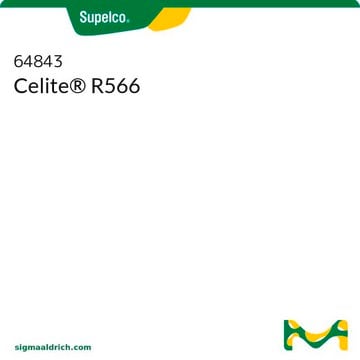22151
Celite® 503
filter aid, treated with sodium carbonate, calcined
Synonym(s):
Diatomaceous earth, flux-calcined
About This Item
Recommended Products
Quality Level
form
powder
quality
calcined
treated with sodium carbonate
composition
Al2O3, 4.0%
CaO, 0.5%
Fe2O3, 1.3%
Na2O + K2O, 3.3%
SiO2, 89.6%
loss
~0.2% loss on ignition, 900 °C
particle size
≤85.1 μm (80% (acc. to Cilas))
pH
>8.5 (25 °C, 10% in aq. suspension)
SMILES string
O=[Si]=O
InChI
1S/O2Si/c1-3-2
InChI key
VYPSYNLAJGMNEJ-UHFFFAOYSA-N
Looking for similar products? Visit Product Comparison Guide
Related Categories
Application
Caution
Legal Information
Signal Word
Danger
Hazard Statements
Precautionary Statements
Hazard Classifications
STOT RE 1 Inhalation
Target Organs
Lungs
Storage Class Code
6.1D - Non-combustible, acute toxic Cat.3 / toxic hazardous materials or hazardous materials causing chronic effects
WGK
WGK 1
Flash Point(C)
Not applicable
Certificates of Analysis (COA)
Search for Certificates of Analysis (COA) by entering the products Lot/Batch Number. Lot and Batch Numbers can be found on a product’s label following the words ‘Lot’ or ‘Batch’.
Already Own This Product?
Find documentation for the products that you have recently purchased in the Document Library.
Customers Also Viewed
Our team of scientists has experience in all areas of research including Life Science, Material Science, Chemical Synthesis, Chromatography, Analytical and many others.
Contact Technical Service



